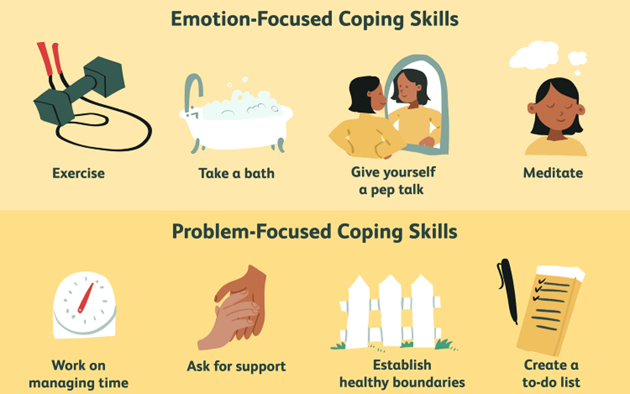A client with depression does not want to communicate with friends, uses television watching as a means of escaping responsibilities, and describes the inability to handle personal circumstances. Which coping strategy should the nurse include in the plan of care?

Concentrate on and ventilate emotions when distressed.
Shift attention from self to the needs and requests of others.
Relax and reduce the amount of effort to solve the problem.
Focus on small achievable tasks, not taxing problems.
The Correct Answer is D
Choice A Rationale:
While emotional expression and ventilation can be therapeutic, it may not be the most appropriate coping strategy for someone with depression who may already be overwhelmed by negative emotions. Ventilating emotions without a structured approach might not provide the desired relief and can even exacerbate feelings of distress.
Choice B Rationale:
This choice may not be suitable for someone with depression because it could lead to further neglect of their own needs and contribute to feelings of guilt or exhaustion.
Choice C Rationale:
While relaxation techniques can be helpful, reducing the effort to solve problems may not be the most effective strategy for individuals with depression. Avoidance of problems can perpetuate feelings of helplessness and hopelessness.
Choice D Rationale:
For a client with depression who is struggling with handling personal circumstances, focusing on small achievable tasks can be a helpful coping strategy. Breaking down larger problems into manageable steps can reduce feelings of overwhelm and gradually improve the client's sense of accomplishment and self-efficacy.
Nursing Test Bank
Naxlex Comprehensive Predictor Exams
Related Questions
Correct Answer is D
Explanation
Choice A Rationale:
While emotional expression and ventilation can be therapeutic, it may not be the most appropriate coping strategy for someone with depression who may already be overwhelmed by negative emotions. Ventilating emotions without a structured approach might not provide the desired relief and can even exacerbate feelings of distress.
Choice B Rationale:
This choice may not be suitable for someone with depression because it could lead to further neglect of their own needs and contribute to feelings of guilt or exhaustion.
Choice C Rationale:
While relaxation techniques can be helpful, reducing the effort to solve problems may not be the most effective strategy for individuals with depression. Avoidance of problems can perpetuate feelings of helplessness and hopelessness.
Choice D Rationale:
For a client with depression who is struggling with handling personal circumstances, focusing on small achievable tasks can be a helpful coping strategy. Breaking down larger problems into manageable steps can reduce feelings of overwhelm and gradually improve the client's sense of accomplishment and self-efficacy.
Correct Answer is B
Explanation
Choice A rationale:
Providing a supportive, structured environment for meals is an important aspect of the overall care plan for individuals with bulimia. However, it should not be the first intervention when a client is admitted with potential physical complications. Addressing the client's physical condition and safety is the initial priority.
Choice B rationale:
This is the correct initial intervention. Bulimia can lead to severe medical complications, including electrolyte imbalances, which can be life-threatening. Assessing the client's weight, vital signs, and electrolyte levels is crucial to determine the severity of physical issues and guide appropriate medical interventions.
Choice C rationale:
Discussing alternative strategies for binging and purging is an important aspect of treatment for bulimia, but it should follow the initial assessment of the client's physical condition. Addressing the client's medical needs takes precedence over discussing alternatives.
Choice D rationale:
While monitoring the client for possible vomiting is important in the care of individuals with bulimia, it should not be the first intervention when the client is admitted. Assessing the client's physical status and addressing potential medical complications should come before monitoring for specific behaviors.
Whether you are a student looking to ace your exams or a practicing nurse seeking to enhance your expertise , our nursing education contents will empower you with the confidence and competence to make a difference in the lives of patients and become a respected leader in the healthcare field.
Visit Naxlex, invest in your future and unlock endless possibilities with our unparalleled nursing education contents today
Report Wrong Answer on the Current Question
Do you disagree with the answer? If yes, what is your expected answer? Explain.
Kindly be descriptive with the issue you are facing.
